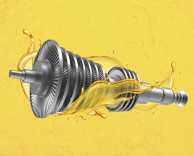Understanding Hydraulic Oil: Base Stock Options and Their Applications
Introduction to Hydraulic Fluids
Hydraulic oil is the lifeblood of a hydraulic system, transforming energy and providing power to various features such as pumps, motors, and actuators. But it does more than just carry energy. It also allows heat to be transferred and contaminants to be removed, sealed, and lubricated. It is crucial to choose the proper hydraulic oil to maintain the overall productivity and lifespan of hydraulic equipment used in various industrial applications.
Core Functions of Hydraulic Fluids:
Hydraulic fluids serve the following vital functions:
- Power Transmission: Hydraulic oil transmits power throughout hydraulic systems effectively.
- Heat Transfer: Hydraulic equipment causes its system to heat as it operates. Heat-dissipating hydraulic oil prevents overheating, to keep you cool through an entire summer of work.
- Contamination Removal: A stream of hydraulic oil is constantly pushed through filters that remove dirt, mud, and other impurities.
- Sealing:In devices, such as pumps and valves, where flow and smooth operation is vital, fluid provides a sealing effect.
It is a lubricant that produces less resisting friction and less heat compared to film of oil, making hydraulic components last longer.
Overview Base Stock Options
The base stock of hydraulic oil is the core ingredient that provides most of the characteristics and performance of the oil. Here are the major categories of base stocks.
Mineral Oils
>There are 3 categories of mineral oils, which are obtained after the processing of crude oil:
- Group I: Conventional refining process; impurities remain, poor oxidation stability.
- Group II:Better than Group I, provides improved oxidation stability and viscosity index.
- Group III:Most refined; excels in performance, including better thermal and oxidative stability.
Mineral oils are commonly applied in the industry for their cheap price and strong compatibility. But their stability may have some influence on this result under extreme conditions.
Synthetic Oils
Synthetic oils are formulated chemically to work better. Types of synthetic oil:
- Polyalphaolefins (PAO): Perfect for high temperatures, with low volatility and superb thermal stability.
- Esters: Widely known for bio-degradability and high lubricating performance.
- Polyglycols (PAG): Great for high-pressure systems and water separation.
- Phosphate Esters: Often used for fire-resistant applications.
Synthetic oils don’t oxidize or break down in heat, making it for extreme industrial applications.
Vegetable Oils
Made from renewable resources such as canola, soybean, and sunflower, vegetable oils are environmentally friendly and biodegradable. They are most commonly applied in industries where environmental safety is a concern, including food processing and agriculture. They may have a lesser oxidative stability than do synthetic oils, however.
Water-Based Oils
Water-based hydraulic fluids, i.e., water glycols and water emulsions, are highly fire-resistant. These liquids are widely used among industries with a high risk of fire, like steel production. Despite their lower lubrication efficiency, their economy and safety make them attractive in certain applications.
For More Information, Visit our Website.
Key Properties to Consider in Hydraulic Oils
Aspects to consider when choosing a hydraulic oil.
- Viscosity:Measures how the oil flows under different temperatures.
- Thermal Stability: Makes sure that the oil is still capable of withstanding high temperatures.
- Resistance to Oxidation: Helps the oil to last longer by resisting chemical breakdown.
- Foam Control:Helps to prevent cavitation and promotes stable energy transfer.
- Lubrication Effectiveness:Protect MOVING Parts and Minimize LEAKS.
- Fire Resistance: Essential for use in a hazardous location.
Environmental and Operational Considerations
Selecting hydraulic oil requires considering the impact on the environment and operations:
- Biodegradability: For those industries that need an eco-friendly solution, we have synthetic oils based on vegetables that are biodegradable.
- Range of Temperature: Look for good thermal stability in the fluid for extreme conditions.
- Pressure demands: Synthetic oils perform better in high-pressure applications.
Importance of Additives in Hydraulic Oil
Additives boost the properties and performance of hydraulic oils.
Common additives include:
- Anti-wear Agents: Safeguard components at high pressure.
- Antioxidants: Prevent oils from oxidizing, and that means longer-lasting oil.
- Rust & Corrosion Inhibitor: Protects metal parts from rust and corrosion.
- Defoamers:Reduce foam build-up and enhance energy usage.
- Viscosity Index Improvers: Maintains a steady performance level during temperature changes.
Applications of Hydraulic Oils Across Industries
The use of hydraulic oils includes:
- Construction: Driving heavy equipment such as excavators and cranes.
- Plant Engineering:Utilised in presses, injection moulding, and automation equipment. systems.
- Automotive:Power steering and brake mechanisms function on hydraulic fluids.
- Aviation:The safety of aircraft applications is maintained by high-performing hydraulic oil.
- Agriculture:Hydraulics are used in tractors and harvesters for superior performance.
Finding the Right Hydraulic Oil: What to Look For
The Right Hydraulic Oil Selection:
- Check operation conditions (temperature, pressure load, etc.)
- Assess the compatibility of the oil with the system hardware.
- If feasible in the industry, make the environmental concern supreme.
- Refer to the manufacturer's recommendations for best results.
Maintenance Tips for Optimal Performance
Good care means longer life for hydraulic systems and oils:
- Check fluids often and of good quality.
- Change filters to stop the at-risk.
- Periodic oil analysis to monitor for wear and contamination.
- Always adhere to the manufacturer’s recommended service schedule.
Conclusion
Hydraulic fluids are necessary to create hydraulic systems and are used to provide energy transmission through the system and regulate heat, as well as provide lubrication and its removal. Knowing these options and the specific applications where they perform is helpful for industries to select the most appropriate fluid for their purpose. Thinking about critical characteristics, environmental considerations, and the significance of additives, companies can work to improve the productivity and life of their hydraulic equipment. Optimum utilization of the hydraulic fluids in a variety of industrial applications can be achieved by proper maintenance and intelligent selection.
Learn more about our services and industry insights by visiting our official LinkedIn page: Minimac Systems





